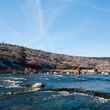If you spend even a small amount of your time enjoying the vast recreational resources of natural environments, you've likely found yourself needing little proof of catastrophic events in order to take a stand against hydraulic fracturing. Better known as fracking, hydraulic fracturing involves drilling deep into underground rock formations and injecting chemical-laden, pressurized water in order to create micro fractures that allow gas and oil which would otherwise be trapped to escape. Fracking operations involve mass-disruption of natural environments through the building of roads and drilling sites, generate millions of gallons of chemical and radiation laced wastewater, have been linked to contamination of groundwater, lakes, and rivers, and evidence continues to mount that establishes fracking operations as the cause of earthquakes around the globe.
Most recently, a series of earthquakes -- culminating in a 4.0 magnitude quake on New Year's Eve -- in Ohio, are being linked to drilling operations harvesting natural gas and oil from Ohio's Utica Shale formation. Scientists have stated that, like earthquakes which have been circumstantially linked to drilling operations in other locations, the links between drilling and subsequent earthquakes are persuasive. Repeatedly, earthquakes occur subsequent to drilling operations in direct proximity to wastewater injection wells and during time periods which match the establishment and operation of those wells. The State of Ohio found the link persuasive enough to shut down operation at 5 wells surrounding the recent Utica Shale formation quakes.






























